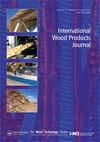Rattan and cane furniture production in Ghana: evaluating the perceived successes and constraints of the business from two major cities
IF 0.9
Q2 MATERIALS SCIENCE, PAPER & WOOD
引用次数: 0
Abstract
ABSTRACTBusiness success levels can be impeded by constraints. This study assessed the perception of successes and constraints in the rattan and cane furniture industry in Ghana. From 250 questionnaires distributed, 200 (80%) were retrieved for analysis at a 95% confidence level. Internal consistencies of questionnaire items for the 12 measures of successes and 22 measures of constraints were Cronbach Alpha 0.789 and 0.862, respectively. The results indicated greater success in the business with all items recording significant (P = 0.001) averages of 3.22–3.95 indicating moderate to very high success with increased income ranking highest. On average, many of the 22 constraint items were rated either moderately high or very high with a lack of financial and technical support being prominent and obtaining 83% to 100% affirmations. Frantic engagement efforts with government and non-governmental agencies are needed towards overcoming or reducing the constraints to enhance success levels towards individual and national growth and development.KEYWORDS: Furniture businessbusiness success factorsGhanaian furniturerattancane AcknowledgementsThe authors express their sincerest gratitude to Mr. Frank Oheneba Kwarteng, Mr. Benjamin Atenka, Mr. Bright Osei Bonsu and all the respondents for their support throughout this study.Disclosure statementNo potential conflict of interest was reported by the author(s).加纳的藤和藤家具生产:从两个主要城市评估商业的成功和限制
商业成功的程度会受到约束的阻碍。本研究评估了加纳藤和藤家具行业的成功和制约因素。从分发的250份问卷中,回收200份(80%)进行分析,置信度为95%。12项成功测度和22项约束测度的问卷项目内部一致性Cronbach Alpha分别为0.789和0.862。结果表明,在业务上取得了更大的成功,所有项目都记录了显著的(P = 0.001)平均值3.22-3.95,表明中等到非常高的成功,收入增加排名最高。平均而言,22个约束项目中的许多项目被评为中等或非常高,缺乏财政和技术支持是突出的,获得83%到100%的肯定。为了克服或减少制约因素,提高个人和国家增长与发展的成功水平,需要与政府和非政府机构密切合作。作者对Frank Oheneba Kwarteng先生、Benjamin Atenka先生、Bright Osei Bonsu先生和所有受访者在本研究过程中给予的支持表示最诚挚的感谢。披露声明作者未报告潜在的利益冲突。
本文章由计算机程序翻译,如有差异,请以英文原文为准。
求助全文
约1分钟内获得全文
求助全文
来源期刊

International Wood Products Journal
MATERIALS SCIENCE, PAPER & WOOD-
CiteScore
2.40
自引率
0.00%
发文量
27
 求助内容:
求助内容: 应助结果提醒方式:
应助结果提醒方式:


